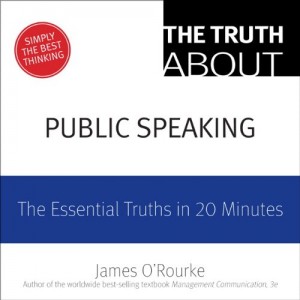In my role as a high school principal, I do a lot of public speaking. I honestly enjoy public speaking and am always looking for ways to grow as a speaker. I enjoy picking up strategies from others that speak on a regular basis and also try to consistently solicit feedback from trusted people in my audience. I enjoyed reading James O’Rourke’s The Truth About Public Speaking to hear his perspective on the issue. The book is full of great illustrations and tips that would benefit anyone that has to speak on a regular basis. Some of his material covered things I already knew, but there were also a few new thoughts that I hadn’t considered before. I have pasted some of the thoughts I highlighted while reading in a list below…
- Good public speakers tend to focus on what can go right. They concentrate on the positive aspects of their message and how it can benefit their audience.
- In a collection of his lectures, passed by oral tradition for many years and later written down as his Rhetoric, Aristotle explains that three considerations are particularly important for every speaker: audience, purpose, and occasion.
- Audience clearly comes first. A presentation is all about them. It doesn’t matter what you want. It doesn’t matter how interesting, important, or powerful you think your message is. All that really matters is what the audience wants. If you can’t deliver a presentation that they find interesting, engaging, useful, valuable, or worth thinking about, then your audience will ignore you.
- Your purpose matters, as well. Consider these questions: Why are you speaking to this group, on this occasion, about this topic? What’s your reason for being here?
- Aristotle gives three reasons why a speaker might address an audience: to inform, to persuade, or to inspire.
- Distinguish between informative and persuasive purposes as you prepare. If your purpose is to inform, you can’t become an advocate on behalf of only one point of view, and you can’t gratuitously toss in your opinions along the way. On the other hand, if you hope to influence what the audience believes or does, then figure out not only how to motivate them to care about the subject, but also how to offer evidence that they find compelling.
- If you care about the outcome, don’t even consider showing up for the speech without rehearsing your remarks.
- Keep in mind that your audience doesn’t want you to read to them, they want you to speak to them.
- If you need more than one sentence to state your goal, then you’re not clear about your objective.
- Listening involves intellectual and physical effort on the part of the listener and, unless properly motivated, is something most people would rather not do.
- If the people seated before you have invested their time and energy (and perhaps some money) in attending your talk, the least you can do is make it worth their while.
- The way you choose to approach your subject and the occasion, and your knowledge of the audience will greatly influence their reaction to you.
- First impressions are not only lasting but frequently quite accurate.
- Communication experts have established the fact that less than a third of the meaning transferred from one person to another in a personal conversation comes from the words that are spoken. The majority of meaning comes from nonverbal sources, including body movement, eye contact, gestures, posture vocal tone, pitch, pacing, and phrasing.
